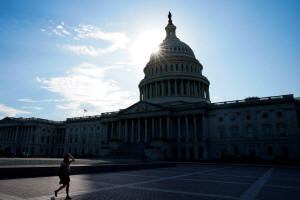Clock ticking for U.S. Congress as Friday government shutdown looms
 Send a link to a friend
Send a link to a friend
 [September 29, 2021]
By Richard Cowan [September 29, 2021]
By Richard Cowan
WASHINGTON (Reuters) - The U.S. Congress on
Wednesday had just two days left before the federal government begins
shutting many of its operations unless Democrats manage to pass a bill
providing new funding for the fiscal year that begins on Friday.
Democratic leaders in the House of Representatives and Senate were
expected to put a temporary funding bill, possibly extending through
Dec. 3, up for a vote as soon as Wednesday in the hope that Republicans
will support it.
Passing that would head off one crisis for President Joe Biden's
Democrats - who campaigned on a platform of responsible government after
Republican Donald Trump's turbulent four years in office.
But more risks are ahead as progressive House Democrats are vowing to
vote against a $1 trillion infrastructure bill set to come to the floor
on Thursday, due to intraparty fights over a much larger social spending
bill.

Behind it all looms the threat of the federal government hitting its
$28.4 trillion debt ceiling around Oct. 18, an event that could cause a
historic default.
With such a daunting agenda hanging in the balance, Biden canceled a
Wednesday trip to Chicago so that he could lead negotiations with
Congress, the White House said.
The House and Senate may vote on a separate bill that temporarily lifts
the debt limit, although that is the subject of a bitter partisan fight.
Senate Republicans refuse to vote for it, telling Democrats to act
alone, while Senate Majority Leader Chuck Schumer has demanded
bipartisan cooperation on a measure to address debts racked up during
Democratic and Republican administrations.
That left Democrats scrambling to find a way to pass a bill and avert a
federal debt default that likely would put financial markets into a
tailspin.
"There's a number of options but you can take it to the bank Democrats
will not let the government default even if Republicans will not vote
for it," Democratic Senator Tim Kaine predicted.
Investment bank Goldman Sachs this month described the standoff as "the
riskiest debt-limit deadline in a decade."
[to top of second column]
|

The U.S. Capitol is seen in Washington, U.S., September 27, 2021.
REUTERS/Elizabeth Frantz/File Photo

DIVISIONS BETWEEN MODERATES, PROGRESSIVES
Amid all this, Biden is holding intensive negotiations with his
fellow Democrats in Congress on a $3.5 trillion bill to expand
social programs and address climate change. Multiple senior
Democrats have said that bill will need to be scaled back to pass.
"We're still meeting in good faith," moderate Democratic Senator Joe
Manchin told reporters following a 90-minute meeting with Biden. He
said the overall dollar amount of the bill was not even discussed
much less agreed on yet.
With deep divisions between Democratic moderates and progressives
over the size and scope of that measure, it appeared unlikely they
would meet their end-of-week goal of presenting a bill to the rank
and file.
The disarray deepened when House Speaker Nancy Pelosi stepped back
from her promise to move the far-reaching legislation alongside the
$1 trillion infrastructure investment bill that already has cleared
the Senate on a bipartisan vote.
Progressive Democrats have threatened to vote against the smaller
bill unless the larger one is nailed down first.
Representative Pramila Jayapal, who heads the Congressional
Progressive Caucus, told reporters on Tuesday that she thought the
vote on the infrastructure bill could be delayed.

Moderate Democratic Representative Josh Gottheimer, referring to the
infrastructure bill, struck a more optimistic tone, saying: "We’ll
get the votes, we'll land the plane and we’ll get this done."
(Reporting by Richard Cowan and Susan Cornwell; Editing by Scott
Malone and Peter Cooney)
[© 2021 Thomson Reuters. All rights
reserved.] Copyright 2021 Reuters. All rights reserved. This material may not be published,
broadcast, rewritten or redistributed.
Thompson Reuters is solely responsible for this content. |